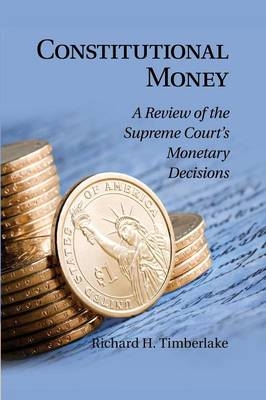
Constitutional Money
Cambridge University Press (Verlag)
978-1-107-46007-2 (ISBN)
This book reviews nine Supreme Court cases and decisions that dealt with monetary laws and gives a summary history of monetary events and policies as they were affected by the Court's decisions. Several cases and decisions had notable consequences on the monetary history of the United States, some of which were blatant misjudgments stimulated by political pressures. The cases included in this book begin with McCulloch v. Maryland in 1819 and end with the Gold Clause Cases in 1934–5. Constitutional Money examines three institutions that were prominent in these decisions: the Supreme Court, the gold standard and the Federal Reserve System. The final chapter describes the adjustments necessary to return to a gold standard and briefly examines the constitutional alternatives.
Richard H. Timberlake is an Emeritus Professor of Economics at the University of Georgia and an adjunct scholar at the Cato Institute. His research specialties are monetary policy and the history of central banking. Dr Timberlake's most recent publications include Monetary Policy in the United States: An Institutional and Intellectual History and Money and the Nation State, with Kevin Dowd. He received his PhD from the University of Chicago.
1. The current state of monetary affairs in the United States; 2. Emergence of money in civilized societies; 3. Bimetallic monetary systems and appearance of a national bank; 4. McCulloch v. Maryland, 1819, and the Second Bank of the United States; 5. 'To coin money and regulate the value thereof'; 6. Craig v. Missouri, 1830; 7. Briscoe v. Bank of Kentucky, 1837; 8. Government issues of treasury notes and greenbacks; 9. Track of the legal tender bills through Congress, 1862–3; 10. Bronson v. Rodes, 1868; 11. Veazie Bank v. Fenno, 1869; 12. Hepburn v. Griswold, 1870: the legal tender issue; 13. Knox v. Lee and Parker v. Davis, 1871: reversal of Hepburn; 14. Monetary affairs in the United States, 1871–83; 15. Juilliard v. Greenman, 1884: the final legal tender decision; 16. Judicial commentaries on the legal tender cases: sovereignty; 17. Other commentaries on the legal tender cases; 18. The [Gold] Currency Act of 1900: monetary affairs in the United States before 1914; 19. The Federal Reserve System, 1914–29; 20. The great monetary contraction, 1929–33; 21. Gold! Where was it? What happened to it?; 22. The Gold Clause Cases, 1934–5; 23. Gold and money in the twentieth century; 24. A Constitutional monetary system.
| Zusatzinfo | 3 Tables, unspecified |
|---|---|
| Verlagsort | Cambridge |
| Sprache | englisch |
| Maße | 152 x 228 mm |
| Gewicht | 390 g |
| Themenwelt | Geschichte ► Teilgebiete der Geschichte ► Wirtschaftsgeschichte |
| Recht / Steuern ► EU / Internationales Recht | |
| Recht / Steuern ► Wirtschaftsrecht ► Bank- und Kapitalmarktrecht | |
| Wirtschaft ► Betriebswirtschaft / Management ► Finanzierung | |
| Wirtschaft ► Volkswirtschaftslehre ► Finanzwissenschaft | |
| ISBN-10 | 1-107-46007-7 / 1107460077 |
| ISBN-13 | 978-1-107-46007-2 / 9781107460072 |
| Zustand | Neuware |
| Haben Sie eine Frage zum Produkt? |
aus dem Bereich


